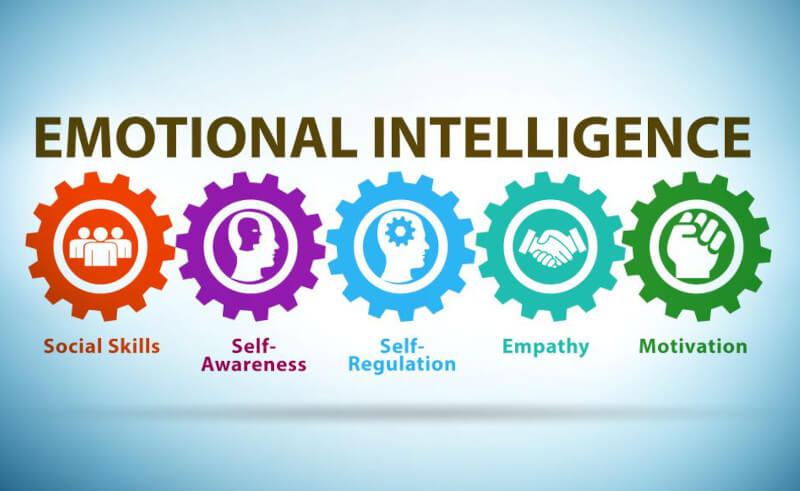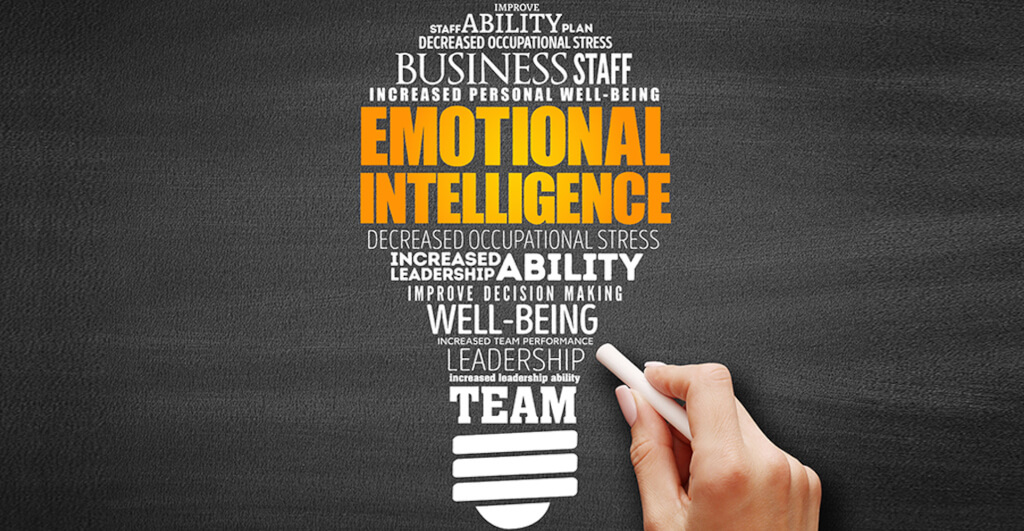The capacity to control one’s emotions, also known as emotional quotient (EQ) or emotional intelligence. Emotional intelligence is the capacity to recognise and manage one’s feelings and moods. A high EQ enables its possessor to understand and appreciate the emotions of those around them. As a bonus, it aids in problem-solving and making connections with others.
The number of perfect grades a person receives is not necessarily indicative of their intelligence. If you want to get ahead in your work, nothing will help more than your academic performance. Emotional intelligence (EQ) is just as important as IQ when it comes to achieving success. A successful person has both technical expertise and the ability to strike a healthy work-life balance.
How can you tell if someone has an inadequate emotional quotient? Is your EQ low and do you feel the need to work on it? Learn more about both in the following text.
Negative Indications of Emotional Intelligence
Emotionally illiterate people have difficulty controlling their emotions, show little empathy, and have a hard time comprehending the emotions of those around them. The following are five characteristics of emotionally intelligent people:
- Self-awareness
- Self-regulation
- Motivation
- Empathy
- Communicative abilities
High emotional intelligence can be defined as success in the aforementioned areas of focus. However, if you excel at only one or two of the aforementioned areas, it may be an indication of low EQ. Some telltale symptoms of emotional illiteracy are:
Lacking in Self-Awareness; Extremely Judgmental
Low-EQ people are stubborn and insist on being correct all the time. They’re constantly in conflict with other people. They aren’t interested in hearing your thoughts and ideas. This occurs because they have difficulty showing or understanding emotion. They have a hard time letting go of the past and learning from their errors.
Unable to Empathise
Low-EQ individuals cannot tell the difference between proper and improper conduct. They frequently make inappropriate comments. Insensitive comments or jokes may be made while a friend is mourning the passing of a loved one. If you bring up their inappropriate behaviour, they get defensive. They probably can’t make sense of the mood around them as they have a hard time reading the emotions of others.
Lack of Responsibility: Putting the Blame on Others
Those who lack emotional intelligence are a common source of conflict because they have difficulty empathising with others and are driven by a need to prove their correctness. They’d rather blame someone else than take responsibility for their actions’ consequences. You are quick to place blame if a crisis arises. To protect yourself, you might try to convince others close to you that they have a misunderstanding of you.
Take the time you burnt for the main dish when you were tasked with making supper. You try to explain to people that it’s not your fault, and they believe you. Whoever asked you to make dinner is the one to blame. You’re merely a novice in the kitchen compared to that individual.
Lack of Resilience and Demotivation
Those who aren’t in tune with their feelings struggle to handle situations that call for emotional maturity. They would do their best to stay out of stressful circumstances. As a result, they are more prone to bottle up their emotions and bear the weight for as long as possible.
Poor Control of Emotional Outbursts Due to a Lack of Self-Control
Those who are emotionally illiterate have a hard time managing their feelings, comprehending others, and expressing their own. They would respond adversely because they are confused and hurting inside and can’t keep their feelings in check and often explode. They are easily angered by minor issues, and their frustration might build up for hours.
Relationship Issues Caused by Lack of Social Skills
Those who are emotionally dim are generally socially isolated. In some cases, kids may not even know anyone. This happens because they have difficulty forming meaningful relationships with other people. Emotional support and understanding are crucial in every kind of relationship. These fundamental aspects of every connection are challenging for someone who has diminished emotional intelligence to grasp.
Narcissism and Other Forms of Self-absorption
People who are emotionally dim desire to be the centre of attention at all times. They stand out because they do the majority of the talking. They were masters at turning the topic back to themselves. It would appear that they are the best of the best. They have achieved more than you have. A low EQ individual may make you feel inferior because you are a triathlete while you are an experienced athlete.
Why Do Some People Have Such a Low EQ?

A person’s emotional intelligence is shaped by several interrelated elements. A few of them are listed below.
Their Approach to Parenting and Methods of Childrearing
Children should have been educated early on how to recognise and control their emotions. The onus for this falls squarely on the shoulders of the caretakers. Parents should encourage their children to identify, discuss, and voice their emotions.
However, it will be difficult for parents with low EQ to successfully cultivate high EQ in their offspring. Children learn by watching their parents, so if they see their parents struggling to control their emotions, their offspring will likely do the same. Children of overbearing parents or those who support the use of physical discipline are more likely to develop a low EQ themselves.
Disorders of the Mind
Emotional dysregulation can be a sign of an issue with mental health. Depressive, anxious, and BPD symptoms may be present in your life. If your EQ is poor, you may suffer from social anxiety, which causes you undue worry whenever you have to interact with other people. You don’t like to go out, therefore you don’t. Low EQ has also been linked to substance abuse problems. The brain alterations associated with addiction can have negative effects on a person’s emotional regulation skills. If you’re ever in a jam, you turn to drugs and alcohol.
Alexithymia
A person with alexithymia has trouble recognising facial expressions and other signals of emotion. They don’t feel feelings at all, and they can’t even put a name to them. Alexithymia results from early life stress, head trauma, or a stroke.
Is Narcissism a Trait of People With Low EQ?
There has been no research into the correlation between narcissism and EQ. No research has shown whether or not narcissists typically have poor EQ. Research consistently demonstrates that narcissists have an inflated sense of emotional intelligence. Because they like to draw attention to themselves, they convince themselves that they have good control over their emotions.
Can a Person With a High IQ Have Low Emotional Intelligence?
Emotional intelligence necessitates both fundamental and broad intelligence, according to research published in scholarly journals. Further research is required to precisely define the connection between EQ and IQ, as there is a wide range of human abilities.
Is It Possible to Develop Strong EQ?
Having poor emotional intelligence (EQ) can have repercussions in many areas. Don’t give up hope. You can still be a good person despite having a low EQ. You can learn to be more emotionally intelligent.
How to Deal with a Low Emotional IQ
Recognizing your feelings is the first step in mastering your emotional intelligence. Being able to put a name to your emotions is important. Let’s say you’ve mastered the art of EQ management. If you can accomplish that, you’ll be able to regulate your emotions during times of conflict and become more hopeful as you work towards your goals.
Improving your EQ is a process that takes time. If you have trouble putting words to your feelings, this is an important first step. Avoid putting undue stress on yourself. The fact that you are aware of and prepared to address your predicament is crucial.
Counselling and Psychotherapy
Your professional and personal relationships will suffer greatly if your EQ is low. You tend to suppress your feelings and avoid pressure. If you bottle up your feelings, you may develop psychological issues like anxiety and depression. Taking that initial step toward recovery can be challenging. Managing mental health issues on your own is extremely unlikely to yield positive results. If you want to get better, you should seek the help of a doctor.
Motivating People with Low EQ
It is simpler to positively influence somebody with low EQ if you have a high EQ. A friend’s mood could use some lifting if they recently lost their job. Encourage your friend to accept the situation for what it is and to focus on bettering themselves to increase their chances of success in the long run by giving them reassuring counsel and constructive feedback. If you have a position of authority at work, resist the urge to utilise your superior emotional intelligence (EQ) to manipulate or brainwash those under you.
Approaching People with Low Emotional Intelligence: Some Suggestions
Tolerate Variety
Recognise and appreciate the individuality of others. Their resistance to change is substantial. Making a strategy for developing self-awareness will help you and the other person. Realise that you need to take a step back, count your blessings, and accept reality as it is.
Provide an Attentive Ear
Help a buddy who is having trouble coping by listening to their story. Get them to understand themselves. Instruct them in the art of introspection and mental processing.
Use Your Head
Given their emotional difficulties, it’s best to handle the situation logically. Communicate with them by laying out the facts and avoiding any emotional overtones. This will help you have more meaningful talks with the low EQ person.
Mind Your Feelings
You shouldn’t be harsh on yourself for feeling this way and not knowing why. Being emotionally illiterate isn’t a character flaw by any stretch of the imagination.




